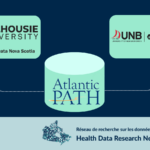Predicting chronic disease enabled by New Brunswick & Nova Scotia data linkage


Predicting chronic disease has gotten faster and simpler with the linkage of data gathered from a longitudinal study involving over 34,000 participants and administrative health data routinely gathered by New Brunswick and Nova Scotia.
A collaboration between the Atlantic Partnership for Tomorrow’s Health (Atlantic PATH), New Brunswick Institute for Research, Data & Training (NB-IRDT) and Health Data Nova Scotia (HDNS) is an important opportunity for advancing health research. “Atlantic PATH is an incredibly rich resource to understand the health of Atlantic Canadians and all of the different factors, like our biology, behaviours, and environments, that impact our health,” said Dr. Robin Urquhart, Atlantic PATH Scientific Director. “This new linkage activity makes our resource more powerful, giving us access to different sources of data to answer complex health questions affecting all Atlantic Canadians.”
Atlantic PATH follows the health of participants from all four Atlantic Canadian provinces to help researchers discover why some people develop certain chronic diseases and cancers — and others don’t — in order to advance prevention and early diagnosis. Atlantic PATH is part of the Canadian Partnership for Tomorrow’s Health (CanPath), a pan-Canadian, longitudinal cohort studying Canadians’ health, behaviours and environments.
This builds on linkage of other regional CanPath cohorts across Canada, creating new research potential that can help us to better understand chronic diseases and how to prevent them. ~ Dr. Kim McGrail
“This is historical, record-level data linkage activity,” explained Dr. Ted McDonald, director of NB-IRDT, an HDRN Canada member. “More importantly, this work is crucial for Atlantic Canada, which has among the country’s highest rates of chronic disease and cancer. It will enable researchers to focus on studies related to cancer and chronic disease that cannot be undertaken without linking the separate data sources.” Dr. McDonald noted other important implications of the data linkage, such as the potential to inform health policy and improve detection, prevention and treatment. NB-IRDT provides researchers with secure access to pseudonymized personal level administrative data and conducts research on policy topics to support evidence informed government decision-making.
“This is an exciting opportunity for researchers across the Maritimes,” said Dr. Sam Stewart, director of Health Data Nova Scotia, also an HDRN Canada member. “Research cohorts like Atlantic PATH take a tremendous amount of work to collect, so it is paramount that we do everything we can to make that data as effective as possible. Linking Atlantic PATH data to the data resources at HDNS and NB-IRDT will enable researchers to discover key, long-term insights into the health of Canadians, and signal an important step forward in how research data can be leveraged and enhanced within the health care system.” HDNS facilitates research and innovation by providing access to linkable administrative health data and analysis for research purposes in a remote, secure, controlled environment.
“This is a critical development, because this linkage includes data from participants in two provinces, so it is already multi-regional in nature,” said Dr. Kim McGrail, HDRN Canada Scientific Director. “It also builds on linkage of other regional CanPath cohorts across Canada, creating new research potential that can help us to better understand chronic diseases and how to prevent them.”
New Brunswick and Nova Scotia are the first Atlantic Canadian provinces to link their administrative data — data that are routinely collected during encounters with the health care system and stored in provincial repositories — to Atlantic PATH. The linkage is the result of a long and deliberate collaboration involving HDRN Canada, Atlantic PATH, CanPath, and administrative data holders in the four Atlantic provinces. Since the transfer of Atlantic PATH baseline data holdings to NB-IRDT and HDNS, researchers can now apply to link Atlantic PATH data to provincial administrative data holdings, such as screenings, hospitalizations, medication use, health outcomes and more.
You can view the New Brunswick data holdings here. See Nova Scotia data holdings here.
